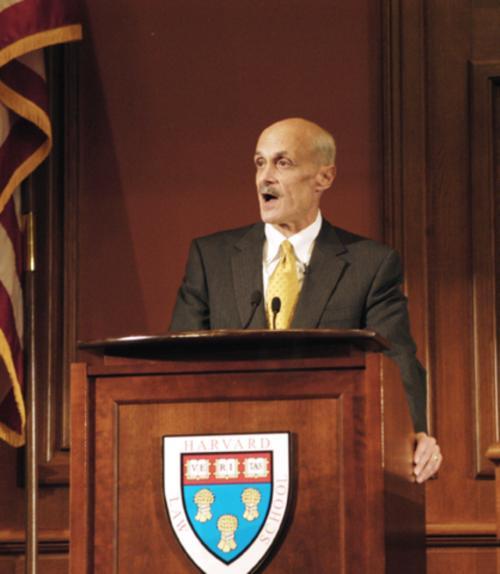
Secretary of Homeland Security Michael Chertoff ’75 defended Bush administration wiretapping policies yesterday at his alma mater.
Secretary of Homeland Security Michael Chertoff ’75 returned to his alma mater last night to defend the Bush administration’s anti-terrorist tactics—including its domestic wiretapping program—in a speech before a packed audience at Harvard Law School’s Ames Courtoom.
The secretary—who has been a lightning rod for criticism of the Bush administration’s response to Hurricane Katrina and for his own role in crafting the USA PATRIOT Act—met only subdued protests on campus. A student group circulated an open letter inside Ames Courtroom assailing Homeland Security Department policies on immigration. But the group, the Harvard Immigration Project, did not want to take a confrontational approach, according to its co-president, second-year law student Molly Thomas-Jensen.
The group’s letter, signed by three dozen Harvard law students, expressed concern over the Homeland Security Department’s practice of deputizing local and state police officers to enforce immigration law. The letter said this practice, “without adequate training or oversight mechanisms, creates very real dangers of conscious or unconscious racial profiling.”
The Immigration Project’s other co-president, second-year law student Alison Kamhi, asked Chertoff about his department’s immigration policies during a question-and-answer session. He did not address many of the group’s specific criticisms, but said that the Homeland Security Department should step up border enforcement, implement a temporary worker program, and make sure that applicants for citizenship have abided by existing immigration laws.
But most of Chertoff’s speech was devoted to the war on terror.
He argued that critics of the Bush administration’s anti-terror policies did not present realistic alternatives.
“The consequences have to be measured with real world decisions when deciding on matters that deal with life or death,” said Chertoff, who lived in Currier House as an undergraduate and earned a law degree from Harvard in 1978. “Terrorism in real life doesn’t wait until you are done reviewing the evidence.”
Chertoff, who has served as Homeland Security secretary since January 2005, said that the government’s programs were critical to the prevention of future terrorist attacks.
“There is a tendency for critics to challenge circumstances where people are arrested because it was unclear about the arrest,” he said. “There is an expectation that the fuse of the bomb must be lit to have credibility.”
Chertoff, who was one of the architects of the Patriot Act while serving with the Justice Department, also said that the laws cited by critics who question the legality of the administration’s programs were created prior to the Sept. 11 terrorist attacks and thus do not respond to present needs.
“Before 9/11, the tools that existed had not been fashioned for a war on terror, but on criminal prosecution,” he said.
According to Chertoff, Al Qaeda shares similar characteristics with conventional wartime enemies because both have clearly defined political aims, attempt to acquire territory, and are able to inflict damage of wide scope—“three fundamental elements of the current struggle that put it in war,” Chertoff said.
During the question-and-answer session, some audience members pressed Chertoff on the duration of the war on terror.
Douglas M. Kochelek, a first-year law student, asked Chertoff to elaborate on the criteria by which the end and success of the war would be measured.
“I can’t tell you exactly when that is going to happen,” Chertoff responded. “The fact that I can’t predict when the war is going to end doesn’t mean that it isn’t a war.”
Chertoff was also asked about the role Iraq played in anti-terrorism efforts.
“The outcome of the war in Iraq will have a significant impact on our safety here at home,” he responded. “We need to make sure Iraq never falls into the category of a failed state.”
One topic that never came up during the speech and subsequent question period was Hurricane Katrina. Chertoff oversees the Federal Emergency Management Agency, whose response to flooding in the Gulf Coast region was widely derided as inadequate.
“My only regret is that we didn’t get a chance to talk about Katrina,” said Climenko Professor of Law Charles J. Ogletree Jr., who introduced Chertoff at the event. “We probably should have spent a little more time on domestic issues than on the international issues.”
Read more in News
Sikh’s Sword Seized By School












